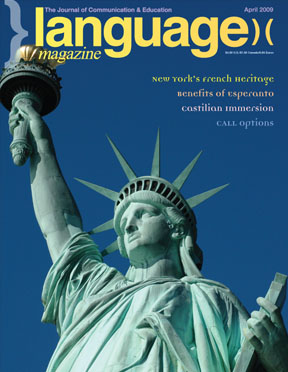Making Dreams Come True
Two educational bills were re-introduced to Congress last month — The Development, Relief and Education for Alien Minors (DREAM) Act and The Educational Opportunity and Equity Commission Act (see News p.10) — which deserve the support of our representatives.
Every year, American high schools grant diplomas to 65,000 immigrant students who were brought to this country at a young age. Many of these youth have attended U.S. schools for most of their lives, but their immigration status bars them from opportunities that make a college education affordable, including in-state tuition rates, loans and grants, most private scholarships, and the ability to work legally. Despite their long-term residence in the U.S., these students are unable to further their educational accomplishments or fully contribute to the only country they know and call home.
Under the provisions of the DREAM Act, undocumented young people could be eligible for a conditional path to citizenship in exchange for a mandatory two year commitment in higher education or the military. Undocumented young people must also demonstrate good moral character to be eligible for and stay in conditional residency. At the end of the long process, the young person can have the chance to become an American citizen.
It has been eight years since the DREAM Act was first introduced to Congress in 2001, during which thousands of bright students have had their ambitions dashed through no fault of their own but due to their inherited status. Not only is it immoral to discriminate against these children, it is impractical — all the evidence shows that college graduates are far more likely to be net contributors to their society than those denied the opportunity.
The Educational Opportunity and Equity Commission Act is only the very first step towards the creation of a more equitable funding structure for public education, but it is a welcome step nonetheless. Never has the inequity of school funding been more apparent than during the current distribution of stimulus package monies. In its allocation of cash to states and school districts, the federal government is relying on traditional formulas, some of which benefit states that spend more per pupil, while others help states with large concentrations of poor students or simply direct money based on population figures. One thing the formulas seem unable to determine is where the money is most needed. As a result, some districts that are relatively rich are receiving more funds than others that are struggling. For example, North Dakota, which has no budget problems, will receive $1,734 per student whereas California, which recently made deep educational spending cuts, will only get $1,336. Utah, where deep school cuts are on the cards, will get $1,250 per student, while Wyoming, with no deficit, will get $1,684.
The education secretary and other politicians are aware of the disparities but argue that it would take too long to come up with a more equitable formula.
Both of these bills are being re-introduced to Congress during an economic crisis when there are other priorities, but the reality is that we would be in a better position now if these bills had been passed when they were first introduced.
Let’s start working on legislation now that will reinforce our education system, distribute funds fairly, and provide opportunities for all students to succeed.
P.S. Visit our new online forum to discuss topics like this, ask for expert assistance, share teaching tips, meet fellow linguists, and voice your opinions on all things linguistic at www.languagemagazine.com/forum.
IN THIS ISSUE:
The World as We Speak
Our forum for changes in world language
Who Knows Where Esperanto Might Lead?
Robert L. Read and Steven D. Brewer explain how Esperanto acts as a springboard for the acquisition of other languages
Lady Liberté Shares Her French Heritage
David Lasserre describes how a non-profit program is helping young New Yorkers retain their French flavor
CALL Update
Language Magazine’s selection of the latest in language and literacy technology
Castilian at Its Source
Kate Sommers-Dawes finds that there’s nothing plainabout Spain’s central meseta
Reviews
Last Writes
Richard Lederer starts his new Teacher Topics series
Plus all the latest news in language learning technology, book reviews, and source information on language funding






